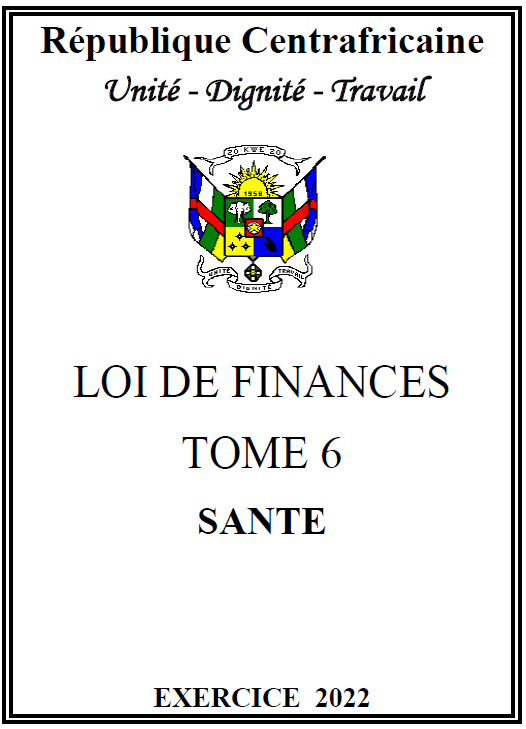
On December 21, 2021, the National Assembly of the Central African Republic allocated 100 million West African Francs (XOF) (US $160,000) in their fiscal year 2022 budget for the purchase of contraceptives. This is the first-time domestic resources have been allocated for family planning commodities within the national budget. Prior to this, all funds for the purchase of contraceptives in the Central African Republic have come from external sources.
The Central African Republic has a population of approximately 4.6 million people, and access to health services including family planning varies across its seven regions [1]. The maternal mortality rate is among the highest in the region with 890 maternal deaths per 100,000 live births [2]. The modern contraceptive prevalence rate (mCPR) is estimated to be around 18% [3]. In their 2019 Family Planning 2020 commitment, the government committed to reduce its maternal mortality rate, increase its mCPR, and ensure that young people have access to youth-friendly health information and services.
Key to achieving these goals was the commitment to allocate funding in their fiscal year 2020 national budget to stock and distribute contraceptives [2]. But it did not happen. In September 2020, the Central African Association for Family Well-Being (Association Centrafricaine pour le Bien Être Familial, or [ACABEF])—an International Planned Parenthood Federation member association—received a grant from Advance Family Planning’s Opportunity Fund to ensure the government followed through.
In February 2021, ACABEF in collaboration with UNFPA and other stakeholders came together to develop an advocacy strategy to ensure the Ministry of Health included the allocation in their budget request to the Ministry of Finance and Budget. However, between armed conflicts and the COVID-19 pandemic, nearly all government processes halted. By May, hostilities had faded, COVID-19 cases were down, and legislative elections held. A new government and National Assembly were established in June, with the Minister of Health remaining in office.
Between March and October, ACABEF held several consultation meetings with civil society organizations, allies, government stakeholders, and individuals within the National Assembly to prepare for the fiscal year 2022 budget cycle. Their aim was to harmonize viewpoints, understand their opposition, and persuade the Ministry that this budget allocation was important. As a result of these discussions, the Director of Family Health and Population asked the Ministry of Health to include a budget allocation for the purchase of contraceptives in their budget request.
In early October, the National Assembly held their first session focused on the 2022 budget. In November, advocates received word that the budget proposal submitted to the National Assembly by the Ministry of Finance and Budget did not include the requested allocation for family planning commodities, with a note citing the omission was due to their need to prioritize funding the war effort.
ACABEF quickly revised their strategy and brought key champions on board to understand why the allocation was not included and chart a path forward. On November 26, UNFPA, FP2030, and ACABEF were invited to meet with the President of the National Assembly on the issue. He was particularly ‘sensitive to the situation as a father having daughters’ and pledged to support the inclusion of the allocation in the budget proposal if the request was reintroduced.
In early December Solange Pagonendji Ndakala, the gender advisor to the National Assembly, asked the National Assembly to reconsider the request for fiscal year 2022. On December 21, 2021, the National Assembly approved the request, allocating 100 million XOF (US $160,000) for the purchase of contraceptives from the domestic budget.
ACABEF is working to ensure the funds are released in a timely manner in consultation with the government, UNFPA, and other stakeholders. They are also looking ahead to advocate for the inclusion of a similar or higher allocation for family planning commodities in fiscal year 2023.
Sources:
- Bohy-Ngombet, Z. (2019). Rapid Assessment of availability of SRH and FP commodities in Jeune S3 supported health facilities in Central African Republic [Powerpoint Slides]. 19th General Membership Meeting of the Reproductive Health Supplies Coalition. Retrieved from: https://www.rhsupplies.org/fileadmin/uploads/rhsc/General_Membership_Meetings/Kathmandu_2019/Presentations/Day_3/Parallel_Sessions/Rapid_assessment_of_availability_of_SRH_and_FP_commodities_in_JeuneS3_supported_health_facilities_in_Central_African_Republic_-_ZARAMBAUD_BOHY-NGOMBET_Romaric_Ghislain.pdf
- Family Planning 2020. (2019). CAR FP2020 Commitment (French). Retrieved from: https://fp2030.org/sites/default/files/FP_2020_RCA_2019.pdf
- Track20. (2020-2021). Central African Republic. Retrieved from: http://track20.org/Central_African_Rep

